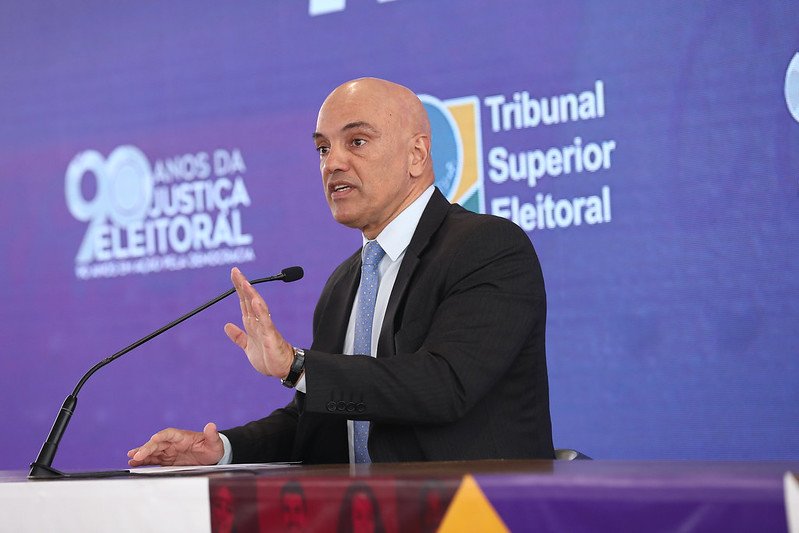Second round in Brazil requires redoubled attention with defense of democracy
Press release WBO October 20th
Lula and Bolsonaro will have decisive confrontation on October 30th
Statements by the current president about the polls and the military again generate concern
President of the Superior Electoral Court, Minister Alexandre de Moraes, in a statement on the 1st round of the 2022 presidential election. Credit: LR Moreira/Secom TSE
The first round of the Brazilian presidential elections, held this Sunday (October 2nd), ended with Luiz Inácio Lula da Silva in first place, with 48.43% of the votes (57.2 million votes) and the current president, Jair Bolsonaro, in second place, with 43.2% (51 million) of the votes. The two will face each other in a decisive second round, scheduled for October 30th.
Bolsonaro has spent the past few years raising unfounded doubts about the ballot box and the Brazilian electoral process. After the counting of the votes, this Sunday (October 2nd) evening, he was questioned by journalists and had the chance to clarify any doubts about his position, but chose to maintain the ambiguity. The president did not say that there was fraud, but announced that he would wait for “the opinion of the Armed Forces” on the ballot boxes and declared that “it is up to the Minister of Defense to deal with this matter”.
In addition, Bolsonaro declared that “everyone is unanimous, not only in the Armed Forces, anywhere in the world, that this system of ours is not 100% protected, so there is always this possibility of something abnormal happening in a fully computerized system.”
With these statements, Bolsonaro insists on delegating to the Brazilian military a role that is not provided for in the Constitution. In addition, he chooses to maintain a position of antagonism with the president of the Superior Electoral Court, Alexandre de Moraes, who, minutes earlier, had declared in an official statement that the elections took place in a free, safe, and transparent manner.
In fact, there were no anomalies in the process, except for a few isolated episodes of violence, some delay in queues at some polling stations, and a continuation of disinformation and fake news campaigns. In any case, the predominance was of an election day that went smoothly and the counting was punctual and transparent. Even so, the president's support base continues to circulate intensively on social networks numerous criticisms of the delay in the voting sessions, seeking to feed a reading that there are problems in the system. With the exception of Bolsonaro, none of the other ten candidates raised any criticism or suspicion about the process.
Risks in the second round
“The tranquility of the first round is explained by the broader interests of the political class in preserving the result of the general elections. Pressure from the democratic field, inside and outside Brazil, contributed significantly to generating awareness and neutralizing the anti-democratic movement in this first stage. At this moment, the statements of the president and his supporters in the sense of disrupting and eventually contesting the electoral process are oriented towards the second round of the presidential elections. It is at this stage that the risks are greatest”, said Paulo Abrão, executive director of the WBO (Washington Brasil Office).
“Shortly after the count of the first round, we saw a public note from the US Secretary of State, Antony Blinken, and also a note from the US Embassy in Brasilia, very quickly, welcoming the process and the result and projecting its expectation for the continuity of peaceful elections. This note was welcomed and enthusiastically received by organized civil society, we have to be very attentive”, says Paulo Abrão.
The second round of elections should channel all the mobilization and concern for the defense of democracy, since the antagonism between Bolsonaro and Lula will be more direct and the margin of difference between them tends to be even narrower than the polls initially indicated, a scenario that pushes to an intensification of tempers, internal tensions and the consequent growth of situations of political violence.
“The real test of Brazilian democracy will be from now on. Bolsonaro fueled unfounded suspicions against the electoral system and democracy in Brazil throughout his administration, and he did so especially during the campaign period. Yesterday's statements clearly show that he intentionally continues to leave the door open to contest the electoral system and the election results. At the same time, both candidates will need to adopt a more moderate tone to expand their chances of winning more votes for the center if they want to win, which could make Bolsonaro tone down his baseless criticism, at least until his chances are more defined. of victory or defeat. I have no doubt that, in the case of an adverse outcome projected for Bolsonaro, on October 30th, he will reissue his extremist stance, without any middle ground.”
James Green, professor of Brazilian history at Brown University and chairman of the WBO Board of Directors.
The WBO evaluates that the tendency of the second round is to be a very close contest. The results of the parliamentary elections showed a growth of the conservative electorate in the country. This growth is not only manifested in the number of votes Bolsonaro received, but also in the election of parliamentary candidates linked to his political field.
The good news was the expansion of Indigenous and LGBTI representation. But not enough to change the adverse profile of the agendas that are most dear to social and human rights movements – such as race, gender, and environmental protection. The fact is that the political profile of the elected Congress will require a lot of political effort from the winning presidential candidate to build a majority of parliamentary support.

